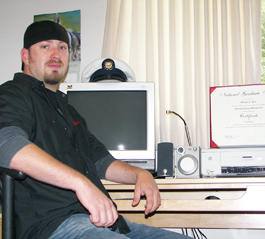home | metro santa cruz index | news | santa cruz | news article

Photograph by Jessica Lussenhop
soldier to slug: Coast Guard veteran Michael Hart is one of a handful of students enrolling at UCSC under the new GI Bill.
Uncle Sam's Best Intentions
Vets enrolling at UC-Santa Cruz wonder if the new GI Bill is too good to be true.
By Jessica Lussenhop
THERE'S all these kids around, and I'm used to being in charge of them," says Michael Hart as he drives up to his apartment at Porter College on the west side of the UC-Santa Cruz campus. Hart is a 30-year-old U.S. Coast Guard veteran with 8 1/2 years of active duty under his belt, during which he served on a 210-foot security cutter based in Miami Beach doing search-and-rescues and drug interception in the Caribbean. Once a month, he returns to the naval base in Alameda to run drills with the reserves. But come Sept. 24, the first day of class at UCSC, he's just another sophomore.
"It's a strange transition," he says at the door of his apartment as two girls wearing cloth reindeer antlers shriek and pound on another door. "Some of these kids look like they're 12 years old."
Hart is one of about 20 incoming undergraduate veterans joining the roughly 80 vets already at UCSC. This will be the first academic year that veterans can take advantage of the new post-9/11 GI Bill, which was approved by Congress in 2008 and just went into effect on Aug. 1. It's generally agreed that the new bill is a vast improvement on the old one, but for veterans attending state-run schools, the benefits are particularly comprehensive.
"It sounds like it's going to be an excellent program," says Daniel Wilson, student coordinator for UCSC's Veteran Education Team Support (VETS) program. "Veteran students will, in the end, be able to focus on school and not have to be biting their nails about the financial stuff."
Under the old GI Bill, veterans were reimbursed about $900 each month, a pittance after tuition, housing and supplies. The new bill covers vets who've served 36 months or more active duty post-9/11, and will cover the full amount of their tuition at a state-run institution. It also provides a housing allowance determined by the cost of living in the area, and a $1,000 yearly stipend for books. Instead of the student waiting for reimbursement, the payments will be made upfront to the school from the U.S. Department of Veterans Affairs.
Hart, who attended junior college for a year to get the prerequisites he needed for a four-year university, says that without the new bill he couldn't afford UCSC. "I was living on savings and it was coming down to the wire," he says. "Hopefully, I can go my three years and not have to take out any loans whatsoever."
But some vets are still feeling wary. "This is the first year. Any time you start something new, you're never going to know what's going to happen," says Wilson. "There's a lot of people who are shaking their heads and saying, 'I'll believe it when I see it.'"
Corrine Miller, director of Services for Transfer and Re-Entry Students (STARS), which administers veterans' programs, says the school is prepared to deal with any hiccups in the new system. "Our financial aid office here has made a commitment to help," she says. "If the VA money doesn't come in, the financial office will put money in to cover it until the GI money comes in."
Wilson also says the wording of the bill has been a cause of some concern, since technically California state school students don't pay "tuition" but rather "fees." However, Craig Osborn, Veterans Service Division manager for the California Department of Veterans Affairs, says that this should not be a problem. "UC-Santa Cruz is a state-funded school, so there is no issue," he says. "It's the best thing going for a veteran getting out of the service, far better than what I received when I got out of the military."
Miller says that the STARS and VETS programs are beefing up their programs as more soldiers return from the current conflicts in Iraq and Afghanistan and more vets seek to take advantage of their benefits. "We're anticipating a dramatic increase in the next couple of years," she says.
In addition to absorbing the impact of any glitches in the GI Bill payments, STARS also offers counseling, a peer-mentor program that matches vets and other assistance to help veterans adjust to a life very different to the one they lived in the service. "They're very used to a more structured environment," says Wilson, a Coast Guard veteran working toward a degree in ecology and evolutionary biology. "The culture of the military makes it hard for a vet student to go to a civilian person and express needs and concerns. It's harder to do than with a fellow vet."
Though adjusting to campus life may not be as difficult for Hart as for some of his peers just returning from Iraq or Afghanistan, he says he's already found the STARS program to be invaluable to his entrance to campus life.
"I'm a sophomore, so technically I'm not supported to be in the apartments. Technically I'm not supposed to be able to park here on campus, but I gotta go to Alameda and drill. If I don't have a car, I'm screwed," he says. "The vet coordinators went in on my behalf and they made an exception. I really didn't want to live in the dorms. I did my crazy party days when I was younger, in the military. I'm focused on school now."
Read news updates daily at www.santacruz.com/news.
Send a letter to the editor about this story.
|
|
|
|
|
|